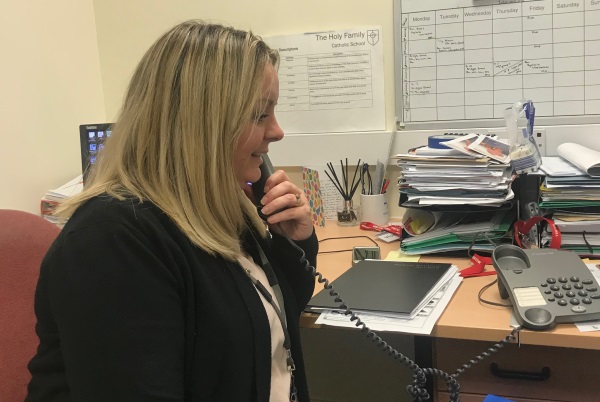At the Holy Family School, designated provision for ASC gives parents and students alike the opportunity to talk emotions.

The one group of parents that are likely to visit their children’s secondary school as much as they did their primary are the parents of pupils with SEND. This is the case at the Holy Family School, and we have designated specialist provision in our school that focuses chiefly on mainstream inclusion for students with ASC.
As educators, we have the privilege of being present at some of the most pivotal moments in young people’s lives. Unfortunately, this also means that we are there when their needs are greatest. Sometimes this puts us in conflict with parents who are struggling to accept the reality of a situation.
We need to remember that, at these times, parents' responses are often emotionally charged. Schools can be the focus of a parent’s frustration even when they realize that we are just the people on the front line who are delivering messages, sometimes from many other agencies. Remaining calm, listening and acting on parents’ concerns is essential.
Thinking back on the experiences of autism within my own family, I remember the distress of realizing that a child is ‘different’ to others. The fear of the loneliness that this ‘otherness’ will make life harder, more complicated. That the future playgrounds will celebrate difference; but also mock it as well.
Socializing became harder as self-awareness grew, screaming at the thought of being left at Boys Brigade, an aversion to polo necks and other things countless to mention. Feeling like a spectator in life rather than a participant.
One reason for the sheer volume of visits is the fact that many have fought hard with schools, in a tragic battle that sapped the emotions over a decade before they even arrive at secondary school.
Claire Kane runs our specialist provision. She works tirelessly with parents through a variety of mediums. With some parents she will have conversations at least once at the end of each day, while with others she can call, email or text as and when. She prioritises her time according to how young people are at certain points of time, and imparts vital information in the morning briefings.
Some students will also have key workers, who filter some of the communication with parents. However, all things concerning placement, mental health or curriculum issues are dealt with by Claire first, before being passed to teaching or pastoral staff.
It is possibly unfair to expect Ofsted to notice all this in a two-day visit, but it’s still a shame that the work we do in this area was not commented on in January’s report.
After all, Claire estimates that over 40 per cent of her time is spent working with parents. Often this means regaining the trust some have lost in the education system through countless rejections from mainstream schools.

When working with parents or carers, Claire’s goal is to synchronize as much as possible the language that parents and teachers share. We regularly run homework workshops, giving parents the tools to help their young people learn equally at home and at school.
Not only is this consistency especially important to students with ASC, but I’m sure you’ll all agree that teaching has changed a lot since many of us were at school – we never learned long division the way they do now!
Parents have found these workshops really useful. We’ve had parents and grandparents attending, and given out practical materials such as word maps, task planning sheets and laminated paper for use as whiteboards.
Adopting ‘zones of regulation’ is a means of helping parents and students to cope with a range of emotions. It also encourages students to learn about their own regulation system and how they can adjust it. They do this through looking for ‘tools’ that help them move back into the green zone, for example by listening to music, reading or going for a walk.
The idea originated in America and was written as a curriculum by Leah Kuypers. We were introduced to it on a training course for SCERTS (social communication, emotional regulation, transactional support) that was led by Emily Rubin, who came over from America to provide training to schools.
We have tried other ways of teaching the skills for emotional regulation, but for even our brightest students it proved difficult to identify individual emotions consistently. The zones approach works very quickly and gives us an indication of when and what we need to do. It’s transferrable to any situation.
The other reason was that many of the emotions scales allow our young people to tell others how they are feeling but then offer no support with what to do next. What’s the point of knowing that you are really angry but having no strategies to help, or in banging the table when you need to calm down but in doing so scaring your classmates?
There are four colour-coded zones, representing how students visually and verbally understand their own emotional state.
Delineating emotions in this way has provided us with a common vocabulary for students to use when discussing how they feel. It requires no special equipment, can be taken with you and takes minimal effort to pass on to parents. Families that have introduced this at home have successfully included children as young as four in talking about their emotions.
What’s the point of knowing that you are really angry but having no strategies to help?
In one house, where the child had previously found it really difficult to accept how his siblings were feeling and adjust his behavior accordingly, will now accept being told that his sister ‘is in the yellow zone because she has exams’, and needs some quiet space.
In school, you can use the zones to predict when students are going to find particular activities difficult. This has helped us plan residential trips for students with autism, looking in detail at the itinerary and travel arrangements.
We’ve opened up our group training sessions to our local ASC support group, AWARE. We’re looking forward to seeing even more parents, teachers and students get on board.
The Leading Parent Partnership Award gives schools a coherent framework to deliver effective parental engagement from early years to post-16.
To find out more, visit the AwardPlace website.
What works for engaging parents?
'On the back foot': a parent's view on choosing the right school for SEND